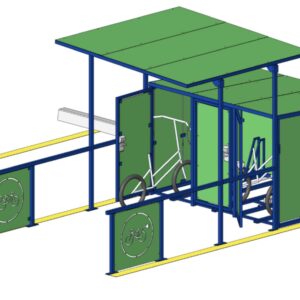A grant award will help the City of Tigard take more steps toward its goal to be, “an equitable community that is walkable, healthy, and accessible for everyone.”
Tigard will receive a $105,800 grant from Portland General Electric’s Drive Change Fund to purchase e-bikes that will be used at two affordable housing facilities. The funds come from the Oregon Department of Environmental Quality and aim to boost transportation electrification. “Transportation electrification plays an essential role in accelerating the clean energy transition,” said PGE’s Elyssia Lawrence in a statement Tuesday.
The City of Tigard will use the money to fund their Power to the Pedal E-Bike Library pilot which they describe as, “a suburban e-bike borrowing program for residents at affordable apartment buildings.” “Locating e-bikes directly in neighborhoods introduces residents to this emerging technology and provides them with free trips for short-term use, eliminating the need for some automobile trips,” the city says. Its part of Tigard’s effort to increase transit and active transportation trips to 20% over the next 12 years. They intend to analyze the results of this pilot with an eye toward launching a larger, citywide system in the future.
E-bike lending libraries have taken off nationwide in the past few years. According to Bloomberg, they’re currently offered in several cities in Vermont; in Oakland, California; Buffalo, New York and several other places.
This is just the latest sign that the City of Tigard is serious about the potential of e-bikes. Last spring we noticed how they hosted a series of e-bike demo days. This also isn’t the first project funded by this DEQ and PGE collab. In 2021 we reported how the Drive Change fund awarded e-bike related grants to the Community Cycling Center, Biketown, and Portland State University.
It’s great to see Tigard moving forward with this pilot. As a recent ODOT report made very clear, the expense of e-bikes is one of the main barriers to access. Until rebates and other purchase incentives are widely available at either the local or state level, programs like this will be crucial in order to bridge the gap.







Thanks for reading.
BikePortland has served this community with independent community journalism since 2005. We rely on subscriptions from readers like you to survive. Your financial support is vital in keeping this valuable resource alive and well.
Please subscribe today to strengthen and expand our work.
I have a car-free friend that lives in an apartment off just Gaarde and currently walks to their job near the Marriott on Bonita, I’m sure this will be welcome news and greatly improve their near daily commute.
A bike ‘lending library’ is a really cool concept and I’m really interested to see how it shakes out.
I love hearing about news like this from the suburbs. Portland is oft cited as a model example of how we can undo so many decades of auto-centric urban development. Many cool things are happening in surrounding suburban cities that will become the models for how we can “fix” suburbs in the USA.
When I moved to Tigard, I was ready to really give the suburban lifestyle a try. A car dependant lifestyle must be so popular in America for a reason, right? And how many places in the world can really claim to have such high percentage of trips taken by car? Isn’t this a really rare chance to try out a lifestyle that so many around the world could only dream of?
Talk about disappointment. I can’t believe we go through so much trouble for such a miserable lifestyle and environment. Maybe it was great when there is no traffic but it simply doesn’t scale, so that is an impossible problem to fix. After giving it an honest go for years, the pandemic hit and notjustbikes and Strong Towns reaffirmed my feelings and gave me well articulated arguments. Before I moved to back to Portland or the Netherlands, I decided to give the city of Tigard a piece of my mind.
Dave Roth and basically the Tigard government were basically like “Yeah, we know”. The Transportation System Plan really puts active transport first. Our priorities over the short and long term really back it up. Last year several projects were completed that greatly improved the rideable and walkable network. It’s a long way to go, but I think we are on the right track.
There is still a car culture in Tigard that worries me. The response on Facebook and Nextdoor to things like this program and the removal of parking mandates is pretty toxic. Not sure how far the push back will go beyond angry social media posts.
But I don’t have any plans to move anymore. I honestly am very comfortable without a car in the very specific part of Tigard that I live in. Hopefully we will increase the number of places in Tigard like this. If there is an American suburb that will transition away from car dependance, Tigard might just make it.
What a great anecdote to read! I think there will always be pushback to transportation projects. They could unveil a plan to widen I-5 to 7 lanes in either direction and you’d still have some deranged folks complaining that it should be 8. I bet as biking and walking networks improve, more people will use and support those modes, while the vocal online minority is increasingly disconnected from reality.
The ultimate boon for Tigard/the West side suburbs would be some kind of frequent rapid transit in the WES corridor. If it could be electrified and run trains every 20-30 minutes it would be an order of magnitude more useful than it is now. As sprawled out as urban areas are, good transit is a must to connect these new active transportation networks to the greater metro area.
I agree, it is increasingly important to not give too much weight to what random people write online. Vocal minority is a great way to put it. I feel like Facebook especially has been for the most part abandoned as a platform except for a certain type. And Nextdoor is… well, a special layer of hell unto itself. Reddit elevates the voices of people who sound smart but really have no idea what they are talking about, upvoted by the majority of other people who don’t know either. I didn’t realize this until I started following subreddits in areas I do have expertise in.
I was so bitter about the SW corridor not passing. But WES + MAX can get you downtown in 40 mins with a 10 minute transfer time. Maybe a bit longer if you like to Zoobomb with your bicycle like I do. Regular service outside of commuting hours would be a compete game changer for me. That and to be extended to both Salem and Milwaukee. The Milwaukee/Beaverton line would be especially crucial IMO because it would provide a connection between these two places and their networks in 30 minutes, which is impossible by car to achieve. As they add tolling to 205, I think the region would find that very useful.
Does anyone care about the negative environmental and human impacts of rechargeable batteries caused by the mining of compounds needed for them? They are severe and significant. It seems everyone is plunging ahead with EV’s without considering the consequences of “clean” energy.
https://www.newsweek.com/2023/02/10/clean-energys-dirty-secrethuman-rights-abuses-cobalt-mining-1775174.html
Does anyone care about the negative environmental and human impacts of carbon fiber bike frames caused by mining and manufacturing of the compounds needed for them? They are severe and significant. It seems everyone is plunging ahead with bikes without considering the consequences of “clean” energy.
https://www.sciencedirect.com/science/article/pii/S0921344922000829
E-Bikes probably have a similar market share of lithium ion batteries as carbon fiber framed bikes have on the global carbon fiber industry – basically nothing. EV cars use at least 100x more raw materials, not to mention other lithium ion battery uses (computers, phones, etc.). Considering how much more energy efficient an ebike is too (so much less energy is spent to accelerate an ebike vs. an e-car), the lithium/nickel/cadmium, etc in the battery gets a lot more bang for it’s buck over the lifecycle of the battery (relative to an e-car).
It’s always worth considering the environmental impact of your choices – but for the vast majority of people in the US, and ebike (especially as a car replacement) would be a huge reduction in environmental damage.
Must there always be someone bringing this red herring up? Electric cars use tons of batteries. Bikes use a couple pounds, orders of magnitude less. It’s not a comparison. If you’re concerned about lithium use, complain about cars, not electric bikes.
Bikes use such tiny batteries, they could feasibly be run on something other than lithium. The batteries would need to be like 20% heavier. Big whoop. They just don’t do it because lithium is available as the “default”, but if E-bikes ever represented more than a tiny drop in the bucket for battery use, that avenue could be explored.
If the e-bike replaces a car, then a tiny amount of lithium etc. mining is substituting for much greater amounts of hydro-fracking, tar sands mining, air pollution, wars for oil, pipeline and offshore drilling rig spills, etc.
If you’re like most people, you have lithium batteries in a phone and a laptop computer, among other devices.
I’m not suggesting that consideration of environmental impact isn’t important, just that you might not be taking into account the whole picture.
Also e-bikes give certain types of people (those with fatigue problems, bad joints, etc.) an option for biking where standard bikes are not practical or them. So in these cases, the battery/motor systems aren’t a luxury.
can we get an update from Tigard on this E-bike library program?